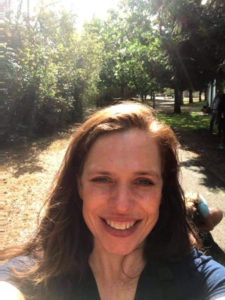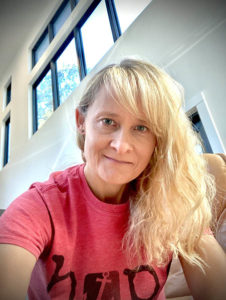Volume 1: Issue 3
By: Kimberly Clement and Cortney Donelson

Shavon sat next to me in 7th-grade English. She wore Guess jeans, sweaters with shoulder pads, and designer perfume. She was popular. I was not. I was the new girl who couldn’t figure out what to do with her curly hair and hadn’t saved up enough babysitting money for trendy clothes.
Shavon groaned when Mr. McKinnon, our English teacher, assigned an essay. When he announced we would be reading it aloud to the class, she fell out of her chair in agony while the class laughed at her antics. I pretended to be annoyed but was secretly excited. I had something to say. That night, I went home and wrote about how strange and wonderful it had been to move from the suburbs of Detroit, Michigan to our small Alaskan town.
A few days later, I sat in front of the class on a small metal stool and pondered aloud at the marvel of snowcapped mountains, wide open spaces, and enormous moose. As I made my way back to my seat, Mr. McKinnon stood. “Raise your hand if you think Kim should keep writing,” he instructed. Every hand went up. In that moment, my life pivoted. I was good at something. I was special. To this day, I stand amazed at how a teacher changed my life with one sentence.
Despite my best efforts—even though I eventually rocked 80s hair and shoulder pads—I never did get Shavon’s attention. But when that teacher gave me a peek at the talent I had to offer the world, I needed Shavon’s attention a little bit less.
—Kimberly, writing coach in Washington State
 Hiding the tremble in my hands with exaggerated movements, I turned in my 9th-grade AP English creative writing assignment by slapping it into the bin on the corner of the teacher’s metal desk. Grammar had always come easy, and I loved to read. At age fourteen, if you had asked me what my dream job was, authoring books would have come just behind “being a marine biologist.” But I figured writing, as a career, was fantasy. To be holed up, sipping hot drinks, and writing for hours on end while surrounded by books . . . well, that was too dreamy to even consider.
Hiding the tremble in my hands with exaggerated movements, I turned in my 9th-grade AP English creative writing assignment by slapping it into the bin on the corner of the teacher’s metal desk. Grammar had always come easy, and I loved to read. At age fourteen, if you had asked me what my dream job was, authoring books would have come just behind “being a marine biologist.” But I figured writing, as a career, was fantasy. To be holed up, sipping hot drinks, and writing for hours on end while surrounded by books . . . well, that was too dreamy to even consider.
A few days later, my teacher handed my short story back to me. C+. I had a couple of points taken off for comma placements. Most of the deductions rested solely on writing style and content. My heart wilted. After class, I shuffled up to her desk to ask about the mediocre grade.
“You’re great with grammar . . . you’re just not a writer,” came my teacher’s justification.
Her words planted themselves in my brain and later grew into weeds called limiting beliefs. For the rest of my school career, I steered into the sciences, trying to forget about writing. Every time I started to write a story or wrote the opening paragraph of a novel, those words reverberated in my mind. “You’re just not a writer.”
It wasn’t until my thirties when I penned my first book. Today, I ghostwrite others’ books. I’ve completed five in total, and I’m working on my sixth. Six books, including one that landed in a best-seller category.
It took me decades to shed the negative label someone else had stuck on me. Girls, don’t let people tell you what you can and can’t do, who you can be and who you can’t possibly become. Don’t accept others’ assessments of your skills or dreams and allow them to morph into limiting beliefs that prevent you from doing what you’re meant to do.
Keep writing. You never know where it will take you!
—Cortney, co-founder of GirlStory and a ghostwriter in North Carolina








Thank you Kimberly and Cortney for sharing your stories on the power of words. Words do matter, good or bad. It is hard sometime to block out or even believe words from people we think are in our corner, and words can affect our self esteem. We must work hard to not let negative words have power over us and continue to do our best…:).
Thank you for your comment, Kim. And for continuing to read GirlStory and support our girl writers! You’re an inspiration.